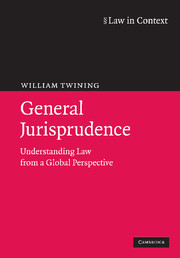Book contents
- Frontmatter
- Contents
- Preface
- Acknowledgements
- List of abbreviations
- Further abbreviations
- Part A
- Part B
- 9 Diffusion of law: A global perspective
- 10 Surface law
- 11 Is law important? Law and the Millennium Development Goals
- 12 The significance of non-state law
- 13 Human rights: Southern voices
- 14 Conclusion
- Bibliography
- Index
12 - The significance of non-state law
Published online by Cambridge University Press: 05 June 2012
- Frontmatter
- Contents
- Preface
- Acknowledgements
- List of abbreviations
- Further abbreviations
- Part A
- Part B
- 9 Diffusion of law: A global perspective
- 10 Surface law
- 11 Is law important? Law and the Millennium Development Goals
- 12 The significance of non-state law
- 13 Human rights: Southern voices
- 14 Conclusion
- Bibliography
- Index
Summary
Taking non-state law seriously
The great bulk of mainstream Western legal theory and legal scholarship in the twentieth century focused on the domestic law of municipal legal systems, sometimes extending to public international law in the narrow sense of law governing relations between states (‘The Westphalian Duo’). Hart, Rawls, Dworkin, Kelsen, and Raz are examples of this perspective. The main exceptions have been legal anthropologists and other scholars who have emphasised the importance of legal pluralism. Recently some jurists interested in the implications of ‘globalisation’ – including Glenn, Santos, Tamanaha, and Twining – have advanced arguments in favour of broader conceptions of law that include at least some examples of ‘non-state law’. This, not surprisingly, has met with some resistance.
In the immediate context, viewing our discipline and its subject matters from a global perspective, both geographically and historically, my argument for a broad conception of law is that focusing solely on the municipal law of nation states (or the Westphalian Duo) leaves out too much that should be the proper concern of legal scholarship. A reasonably inclusive cosmopolitan discipline of law needs to encompass all levels of relations and of ordering, relations between these levels, and all important forms of law including supra-state (e.g. international, regional) and non-state law (e.g. religious law, transnational law, chthonic law i.e. tradition/custom) and various forms of ‘soft law’.
- Type
- Chapter
- Information
- General JurisprudenceUnderstanding Law from a Global Perspective, pp. 362 - 375Publisher: Cambridge University PressPrint publication year: 2009
- 1
- Cited by



